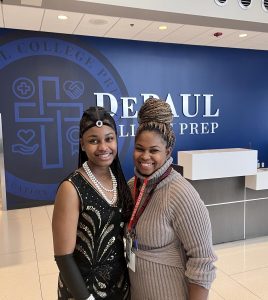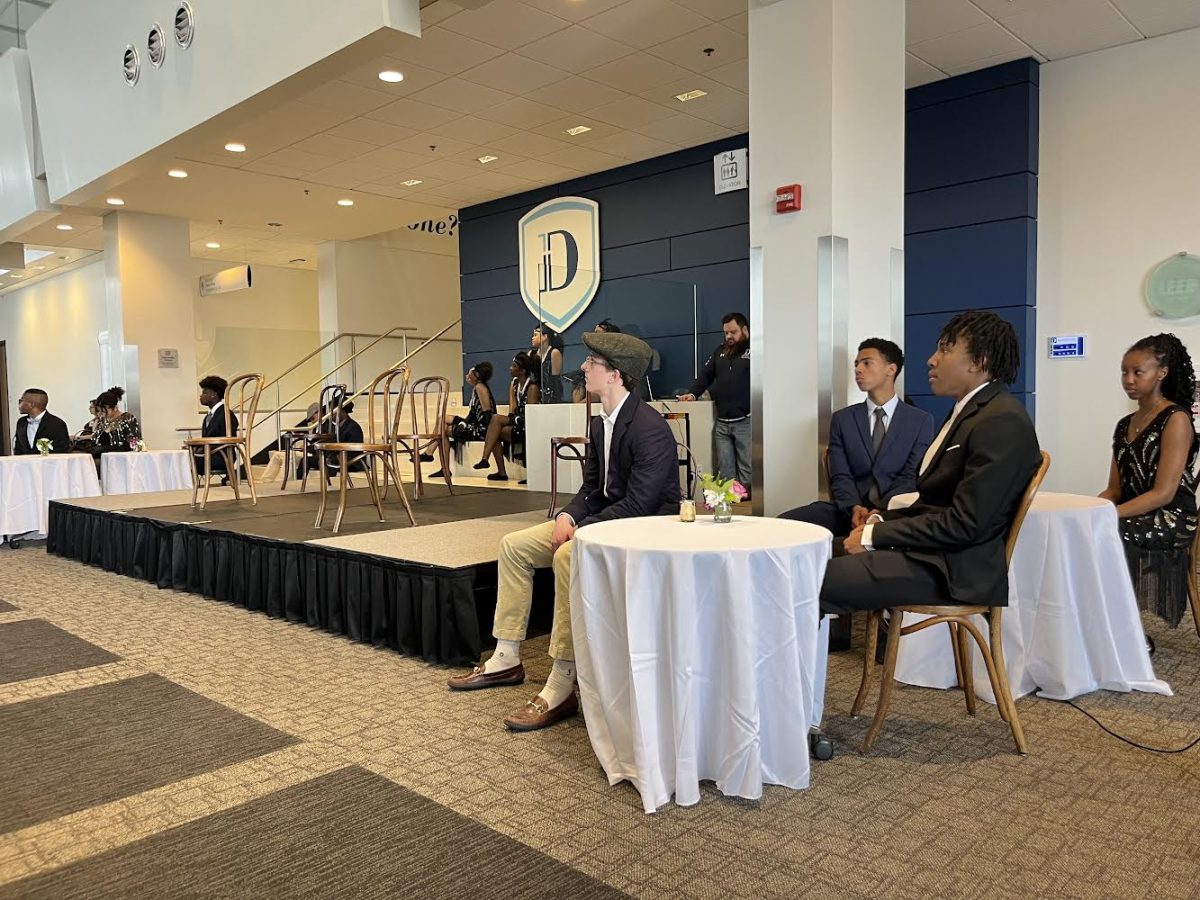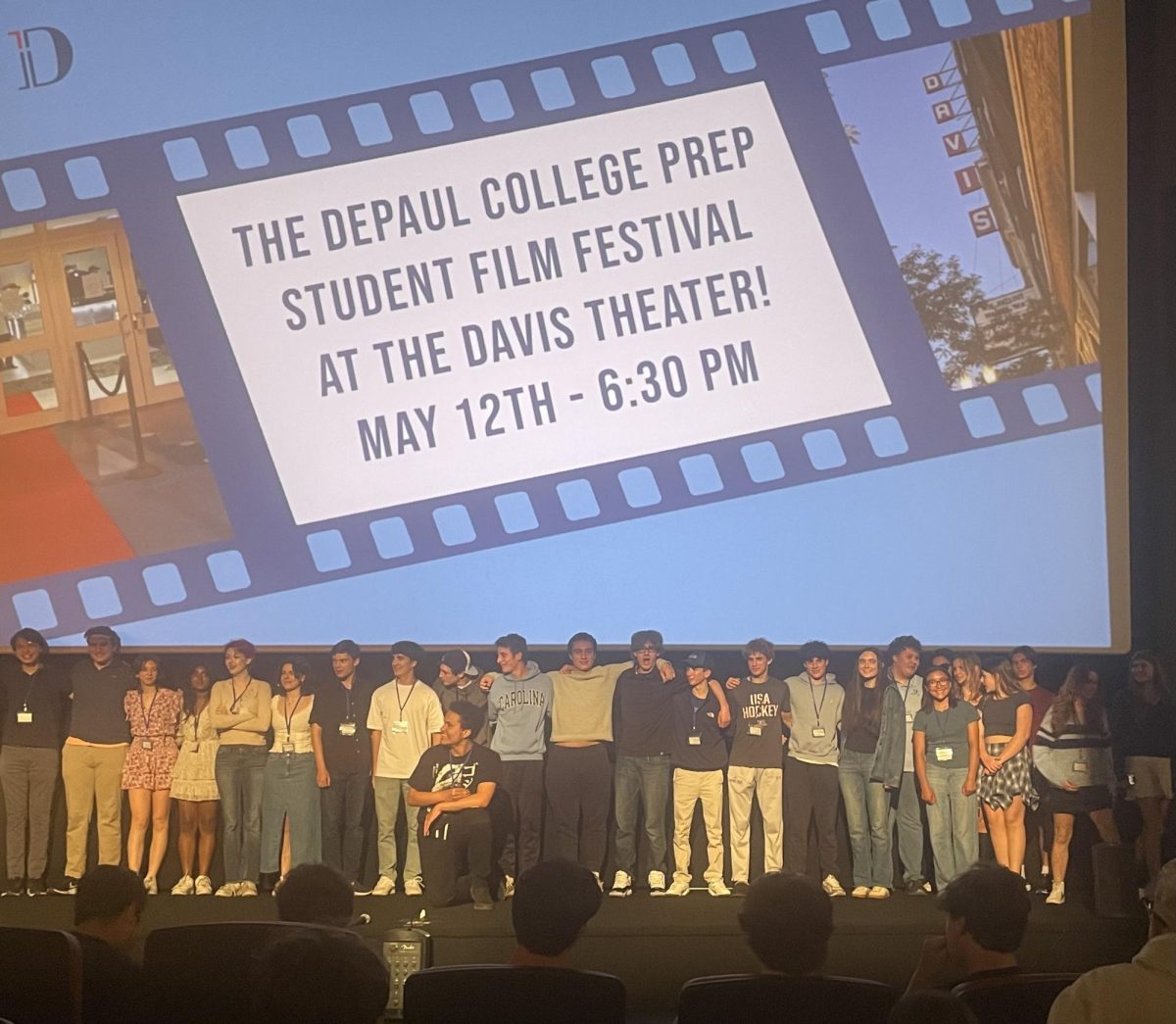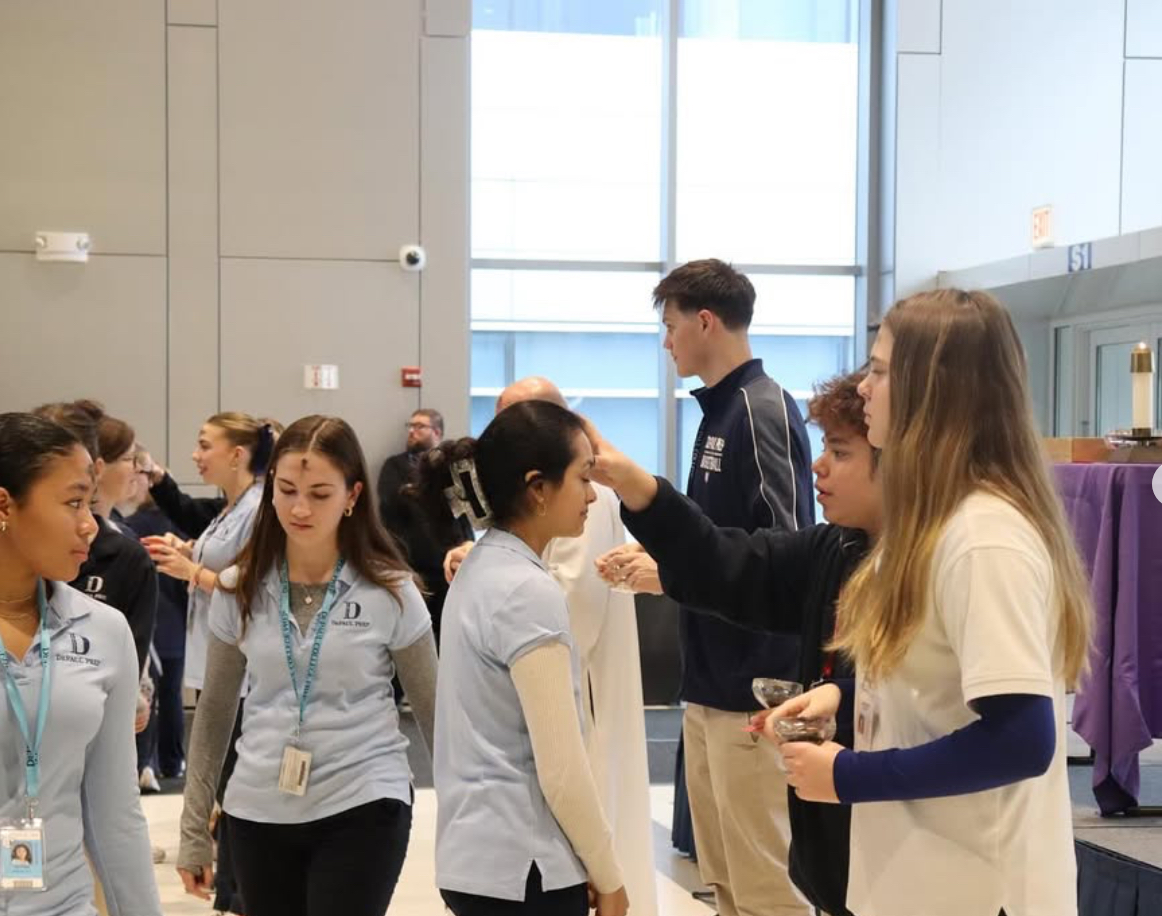On February 23rd, the Black Student Union (BSU) at DePaul College Prep put on a schoolwide assembly in celebration of National Black History Month. Sounds of instruments and voices echoed through the Commons space as students and faculty were transported back into the Harlem Renaissance—a historically notable movement during the 1920s and 30s focused on the comeback of African American Culture in the Harlem neighborhood, New York City, U.S.
Kendall Mallette is the head club moderator for BSU and Director for Diversity, Equity, and Inclusion at DePaul Prep. When asked to describe the main concept behind the event after it concluded, she said, “The theme of the assembly was the Harlem Renaissance, and then [BSU] specifically chose to focus on an iconic place of entertainment and business—which was the Cotton Club at the time.”
Throughout the assembly, BSU members took on the characters of prominent Black figures who performed regularly at the Cotton Club, honoring the impact of these individuals on Black history by performing their past works and dressing the part. Some students, for example, recited famous speeches while wearing 1900s-inspired dresses and suits.
Other influential artists were portrayed as well, including writers Langston Hughes and Zora Neale Hurston, who Mallette explained “technically wouldn’t be sharing their poetry and spoken word at the Cotton Club—[there] was really just dance and music—but it made sense for what [BSU] was trying to do in educating our community.”
A few BSU members even choreographed and performed their own dance to highlight the other forms of expression present at the Cotton Club.
“The Cotton Club dancers were a major feature of that time, and we’ve got some students who typically always want to put together a piece,” said Mallette.
One of those dancers was BSU member and sophomore Jennifer Spencer.
“We were trying to recreate what life was like during the Harlem Renaissance,” explained Spencer. “Especially in the Cotton Club, which was a really well known club that Black people performed at.”
It took Spencer and her classmates multiple rehearsals inside and outside BSU meeting time to prepare for their performance, involving lots of coordination around other extracurricular activities between the dancers.

“The five of us as a group decided to practice on Mondays and Tuesdays when people didn’t have other sports practices,” she said. Spencer also added the group often met on Sundays if conflict arose on the previous two days.
To choreograph the dance, each group member contributed a part after hearing the music.
“We all came up with bits and pieces of the dance…We heard the music and we were like, ‘Oh, I feel like this would look good here, or I feel like that would look good there’” Spencer explained. “And so we all pitched in and came up with ideas for the dance.”
Spencer and dancers were not the only ones preparing in advance. The BSU began planning the entire assembly in November.
“We usually start talking about the theme in November,” Mallette explained. “It takes a little while for everyone to settle on something of impact.”
Members of BSU decided on roles before Christmas break, and as Mallette phrased “hit the ground running” in January. The remaining weeks leading up to the assembly were filled with many practices.
“We usually have five to six weeks after we get back post break until the actual assembly…Then we rehearse and practice and practice,” Mallette emphasized.
Open Mic and Unity Dinner
After the schoolwide assembly, BSU closed National Black History Month with their annual Open Mic and Unity Dinner five days later in the South Wing Dining Hall. During this afterschool event, students and faculty were invited to join BSU and celebrate the end of this month-long celebration with food and drinks while members and students listened to and performed their own spoken word.
Unlike the assembly’s Harlem Renaissance theme, the Open Mic had no specific focus. While there may have been topics at past open mics for students to follow, Mallette and other BSU members reasoned that a set theme may restrict the creativity of some performers.
“The reason I don’t want there to be a specific theme is because I think it boxes in the performers,” explained Mallette. “I don’t want them to feel like their work has to speak to a specific theme.”
Along with the content of their performance, Mallette believes a theme may limit the students who choose to participate. In fact, this year Mallette noticed that without a specific focus, there was an even more “diverse group of students racially [and] faith[fully]” present at the event.
Junior Aviva Laegeler, a member of the poetry club Ram Slam Poets, was one student performer who showcased her creativity at the Open Mic as she delved into her religious beliefs.
“Aviva Laegeler. I mean, she kicked us off,” Mallette recalled. “Her poem, it was really raw, [and] there were a lot of themes about her Jewish faith.” Mallette explained that a given theme for the Open Mic may have prevented students, like Laegeler, from showcasing their talents and individuality.
While National Black History Month celebrates African American and Black heritage, BSU members want every DePaul Prep student and faculty member to take part in these types of heritage celebration events.
“We want a mix of folks present. That’s the whole point—it’s a unity dinner,” said Mallette. “It’s nice to have the performers represent a diverse set of people as well. I really like that.”
Mission of diversity, equity, and inclusion
BSU members strove to commemorate Black History in an effective and exciting manner during the schoolwide assembly, Open Mic, and Unity Dinner. As Mallette phrased, BSU was able to do “something that was entertaining and yet at the same time, expose [the school] community to some key figures in Black History.”
According to Mallette, these types of school events bring DePaul Prep closer as a school community, providing an opportunity for students to share their culture, beliefs, and values with peers. She believes this result aligns with her responsibility as Director for Diversity, Equity, and Inclusion (DEI).
“A DEI Director can and should of course be a voice for marginalized groups in the building. For groups that are not as well represented in a community,” she said.
However, Mallette believes the role of a DEI Director at any educational institution extends beyond this fold.
“Ultimately that person’s role is to make sure everybody feels they belong,” Mallete explained. “Everyone should feel like they belong. Like this school is their place, that this is their space, that they feel seen and heard. Including, in this case, our majority population which constitutes White people [and] Catholic people.”
In recent years, DePaul Prep’s student enrollment has increased tremendously—reaching a record of over 1,200 students leading up to the 2023-2024 school year. With this rapid growth has come a progressively diversified student body, filled with the different backgrounds and experiences of students and faculty. As a result, members of the school community have taken initiative in spreading a sense of inclusion and awareness throughout the building.
Freshman Berkley Blust is one student who has chosen to speak up. Blust, a perinatal stroke survivor, spoke during morning announcements on February 29th (Rare Disease Day is February 28th or 29th on leap years) about rare diseases.
”She made an announcement and created posters about Rare Disease Day, which was a new concept to many of us here,” said Mallette. “Because she is a person who was born with a rare disease, she’s extremely aware and has chosen to be an advocate and spokesperson for people who have been affected by rare diseases.”
In her announcement, Blust went on to define Rare Disease Day and the purpose behind the national observance. Afterwards, she added, “I am sharing this all with you because I am Rare: I am a perinatal stroke survivor. Perinatal strokes occur in about 1 in 3500 births. I share this to ask not for sympathy, but for empathy, understanding and compassion for anyone you encounter who has a medical condition.”
Mallette explained these types of initiatives conducted by students, like Blust, allow a school community to “learn and grow.” These experiences then help shape students into open-minded individuals and prepare them for the real world.
“It’s important that if [the school] says, ‘Yes, we’re college prep,’ [teachers] want to give you the one, two, three’s, and the a, b, c’s to prepare you academically for your next. But part of being prepared for your next is more than what you learn in the classroom,” said Mallette.
As Mallette explained, after highschool if “you’ve never been around or spent quality time with someone that’s different than you—it doesn’t matter what your background is—but that’s different from you, and that feels uncomfortable for you, well that’s going to be an uncomfortable year when you get to college.” For these reasons, she believes it’s vital that school communities seek opportunities to expand their student and faculty diversity.
“The beauty of being in an environment like this is that we’re not homogenous. We’re not solely comprised of the same race, gender, faith, learning style, sexual orientation, socioeconomic group and more —we’re a beautiful mix,” she said. “A tapestry of the rich cultures, heritages and backgrounds that exist in this city.”
Schoolwide assemblies and events, like BSU’s “Harlem Renaissance assembly,” help to recognize and celebrate all aspects of diversity at DePaul College Prep, which Mallette looks forward to continually increasing in the future.







